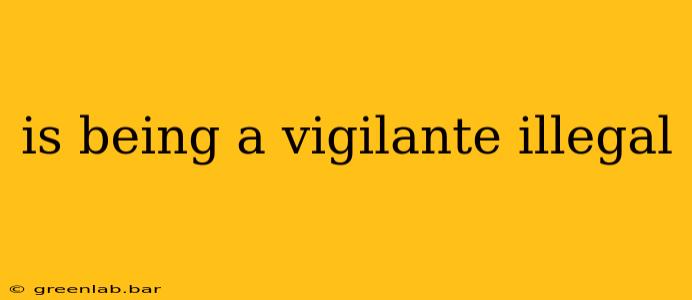The question of whether being a vigilante is illegal isn't a simple yes or no. It's a complex issue steeped in legal nuances, ethical considerations, and societal perceptions. While the act itself might seem straightforward—taking the law into your own hands—the reality is far more intricate. This article explores the legal ramifications and ethical dilemmas associated with vigilantism.
The Legal Landscape: A Murky Definition
The core problem lies in the definition of "vigilante." There's no single, universally accepted legal definition. Generally, a vigilante is someone who takes the law into their own hands, often using force or violence, to punish those they believe have committed crimes, even without legal authority or evidence. This broad definition opens the door to a wide range of actions, each with potentially different legal consequences.
Potential Charges:
Depending on the specific actions taken, a vigilante could face numerous charges, including:
- Assault and Battery: Physically harming someone, even if they're perceived as guilty, is a criminal offense. The severity of the charge depends on the extent of the injuries inflicted.
- Kidnapping: Unlawfully seizing and confining someone is a serious felony, regardless of the perpetrator's intentions.
- False Imprisonment: Similar to kidnapping, but typically involves shorter periods of confinement and less force.
- Murder or Manslaughter: If a vigilante uses lethal force, they face potential charges ranging from manslaughter (unintentional killing) to murder (intentional killing). The circumstances surrounding the killing will heavily influence the charge.
- Violation of Civil Rights: Depending on the context, a vigilante's actions could infringe on the civil rights of the victim, leading to federal charges.
- Obstruction of Justice: Interfering with a police investigation or preventing the arrest of a suspect can result in serious consequences.
- Weapons Charges: Possessing or using illegal weapons during a vigilante act will result in additional charges.
The Ethical Quandary: Justice vs. Lawlessness
Even when the legal consequences aren't immediately apparent, the ethical implications of vigilantism are significant. While some may sympathize with a vigilante's motives—a desire for justice, frustration with the legal system—taking the law into one's own hands undermines the rule of law. This can lead to:
- Erosion of Trust in Law Enforcement: Vigilantism suggests a lack of faith in established legal processes, potentially damaging the relationship between citizens and law enforcement.
- Increased Violence and Chaos: A cycle of violence can easily ensue when individuals bypass the established legal system.
- Unfair and Inconsistent Justice: Vigilantes lack the training, resources, and impartiality of the legal system, leading to potentially flawed judgments and unfair punishments.
- Potential for Misidentification and Wrongful Actions: Vigilantes may act on assumptions or misinformation, leading to innocent people being targeted.
The Fine Line: Self-Defense vs. Vigilantism
It’s crucial to distinguish between legitimate self-defense and vigilantism. Self-defense is legally protected when an individual uses reasonable force to protect themselves or others from imminent harm. However, self-defense ceases to be a valid justification when the threat has passed or excessive force is used. The line between self-defense and vigilantism is often blurred and highly dependent on the specific circumstances.
Conclusion: A Complex and Risky Undertaking
In conclusion, being a vigilante is overwhelmingly illegal and ethically problematic. While the impulse to take justice into one's own hands might be understandable in certain contexts, the legal and ethical risks are immense. The established legal system, despite its flaws, offers due process, safeguards against injustice, and ensures accountability. Bypassing this system carries significant personal consequences and undermines the foundations of a just and equitable society. Instead of vigilantism, engaging with community organizations, advocating for legal reform, and reporting crimes to law enforcement are more constructive and legal ways to address perceived injustices.

